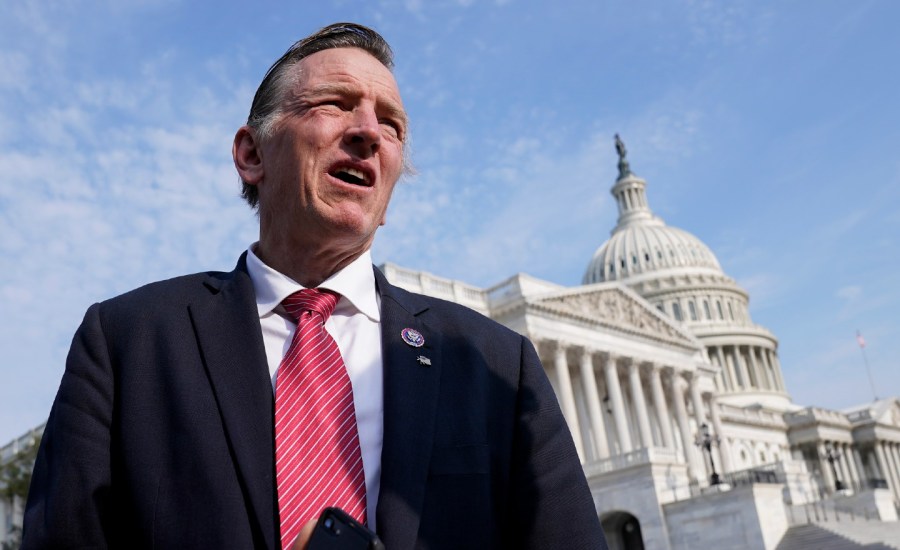$241M went to constituents of Republicans pushing CFPB changes: watchdog
The Consumer Financial Protection Bureau (CFPB) has returned hundreds of millions of dollars to consumers who are also constituents of Republican lawmakers who support changes to the bureau’s funding structure, according to a new report watchdog Accountable.US shared exclusively with The Hill.
Accountable.US’s analysis focused on 10 states: Arizona, Kentucky, Michigan, Missouri, New York, North Carolina, Pennsylvania, South Carolina, Texas and Wisconsin. It found that consumers in these states received more than $240.9 million through the CFPB’s Civil Penalty Fund from 2012 through 2022, according to Accountable.US’s analysis of data provided by CFPB.
“Republicans in Congress should be celebrating the fact the Consumer Financial Protection Bureau has recouped billions of dollars for families who’ve been ripped off by bad actors in the financial industry,” Liz Zelnick, director of Accountable.US’s program on economic security and corporate power, told The Hill.
“Instead, many Republicans are rooting for efforts to defund and defang the nation’s top consumer advocate after they’ve taken millions of dollars from greedy big banks to predatory lenders that want no consumer protections at all,” Zelnick said.
The CFPB is funded by the Federal Reserve, an independency agency primarily funded by interest earned on its government securities.
But the U.S. Supreme Court agreed to take up a case brought by a payday lending group that would subject the CFPB to congressional appropriations, reviewing a lower court decision that found the bureau’s funding structure “violates the Constitution’s structural separation of powers.”
A slate of 132 bicameral Republican lawmakers signed an amicus brief in July urging the Supreme Court to affirm the ruling.
The funding structure “neutered” congressional oversight of the CFPB, meaning the agency’s funding will “continue in perpetuity without the CFPB ever needing to return to Congress, hat in hand,” the lawmakers argue in the amicus brief.
Republicans say the debate is about holding bureaucrats accountable, while critics including left-leaning Accountable.US say the case could threaten the future of the CFPB.

Throughout their careers, Republican amicus brief signatories in these 10 states received more than $51 million from individuals and PACs affiliated with the financial industry players regulated by the CFPB, according to Accountable.US’s analysis of campaign contributions compiled by the nonpartisan money-in-politics organization OpenSecrets.
The U.S. Chamber of Commerce, American Bankers Association, American Financial Services Association, Consumer Bankers Association and other industry groups filed an amicus brief last month arguing the CFPB’s funding structure unconstitutional, as it is “‘double-insulated’ from the constitutionally-mandated check of Congress’s purse.”
There is some division within the industries regulated by the CFPB over how the agency should be regulated and funded.
“The CFPB’s funding structure is constitutional and critical to ensuring that it can carry out its consumer protection mission free from undue industry influence,” wrote community development credit unions and financial institutions in a May amicus brief.
Senate Banking Committee Ranking Member Tim Scott (R-S.C.), House Financial Services Committee Chairman Patrick McHenry (R-N.C), House Financial Services Subcommittee on Financial Institutions and Monetary Policy Chairman Andy Barr (R-Ky.) and House House Energy and Commerce Subcommittee on Oversight and Investigations Chairman Bill Huizenga (R-Mich.) spearheaded the amicus brief.
Scott, who is running for president, applauded the Supreme Court for taking up the CFPB funding, calling it “an agency that lacks transparency and seeks to operate beyond its jurisdiction.”
While some Republicans focus on the transparency and accountability aspect, others have gone further. Rep. Paul Gosar (R-Ariz.), who signed onto the amicus brief, has “vocally supported a full repeal of the CFPB as long as it exists in its current form,” according to his House website.
Huizenga told American Public Radio’s “Marketplace” in 2016 that the CFPB needs to look “needs to look much, much different” and wouldn’t rule out its elimination.
“The fact is the CFPB should be funded through the appropriations process. This ensures that taxpayers, through their elected representatives in Congress, have a say in how the bureau operates. Even the CFPB, and its current unconstitutional structure, must answer to the American people,” a spokesperson for Huizenga told The Hill.
Spokespeople for Scott, McHenry, Barr and Gosar did not return requests for comment.
“Leave it to a left-wing, dark money group to support an unaccountable federal bureaucracy that returns less than $42 per year to approximately 0.48% of Michiganders,” Huizenga’s spokesperson added.

The liberal “dark money” group New Venture Fund disclosed contributing $2.7 million to Accountable.US on its 2021 Form 990, the most recent available. While Accountable.US makes its Form 990s public, it does not voluntarily disclose its donors.
“We’d be more than happy to join other 501(c)(3) entities in releasing more funding information should the law change,” Accountable.US Communications Director Jeremy Funk told The Hill, noting their support for transparency legislation like the DISCLOSE Act.
It remains to be seen how prominently politics, one reason the CFPB and other financial regulators were set up to operate independently of congressional appropriations, plays into the case.
The Supreme Court has scheduled oral arguments for when it returns in October.
Copyright 2023 Nexstar Media Inc. All rights reserved. This material may not be published, broadcast, rewritten, or redistributed. Regular the hill posts











